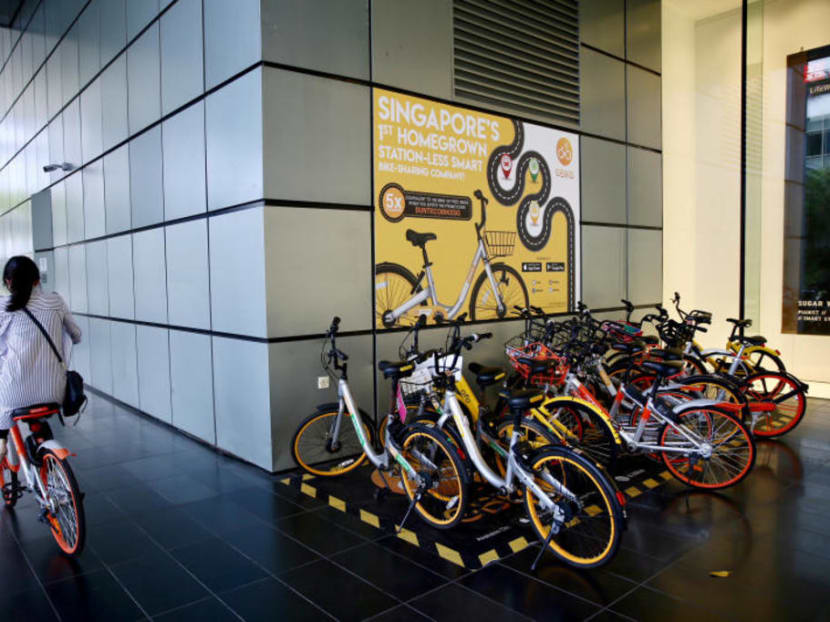Number of shared bikes in S’pore to be halved, some firms to downsize fleets significantly
SINGAPORE — The number of shared bicycles in Singapore will be reduced by about half under a new licensing regime, as the authorities announced on Friday (Sept 28) that six bicycle-sharing operators will be granted licences.

The number of shared bicycles in Singapore will be reduced by more than half under a new licensing regime, as the authorities announced that six bicycle-sharing operators have been granted licences.
SINGAPORE — The number of shared bicycles in Singapore will be reduced by about half under a new licensing regime, as the authorities announced on Friday (Sept 28) that six bicycle-sharing operators will be granted licences.
With some operators allowed much smaller fleet sizes than what they had sought, the total number of shared bicycles in Singapore is set to plunge to 55,000 from more than 100,000 presently.
The Land Transport Authority (LTA) said in a statement on Friday that it will award full licences to China-based companies Mobike and Ofo, as well as local operator SG Bike.
Homegrown player Anywheel, ride-hailing firm Grab’s bicycle-sharing marketplace GrabCycle, and Chinese firm Qiqi ZhiXiang will be given "sandbox" licences, for companies without a long-enough record of operating shared bicycles here.
The licences will be granted at the end of next month after the operators pay their licence fees, the LTA said.
Some operators, such as Ofo, are expected to have to downsize their fleets significantly after the licences are awarded.
The 80,000 bicycles under Ofo will be capped at 25,000. Mobike, which previously said its fleet was “in the thousands”, will similarly be allowed to operate 25,000 bicycles.
SG Bike, which has 2,200 bicycles, can use 3,000 bicycles.
Anywheel, with a fleet of more than 1,000, told TODAY previously that it applied for a licence to run 30,000 bicycles. The operator said on Friday that “changes in the application process” meant that it eventually applied to operate only 1,000 bicycles — the maximum a sandbox licence allows. It was granted this.
GrabCycle may operate a fleet of 1,000 bicycles and, Qiqi ZhiXiang, 500 bikes. The performance of these newer operators will be monitored before the LTA decides whether to grant them full licences.
Operator GBikes, which exited the market earlier this year, failed in its bid to obtain a licence, as it did not meet the assessment criteria, said the LTA.
Ofo Singapore’s general manager Isabelle Neo said that the company was “disappointed” by the decision. Its allotted fleet size of 25,000 bicycles will “not be sufficient to facilitate the high demand for bike-sharing in Singapore”, she said.
While the licence will provide “operational certainty”, Ofo said it needed 80,000 bicycles to support the demand for first- and last-mile commutes here. “Our users will find it more difficult to access a shared bike with the reduced fleet size,” it said.
Ofo’s excess bicycles will be removed from the streets and stored in its warehouse, and will be used to replace damaged bicycles.
SG Bike said that it will expand its fleet to 3,000 within the next month.
Anywheel has set its sights on applying for a full licence in January and is upgrading parts of its fleet, said its strategy manager Seet Rui Jie. Excess bicycles will be kept in its warehouse for future expansion.
Grab said that GrabCycle’s sandbox licence will give it the opportunity to expand its transport offerings.
Without specifying a time frame, the LTA said that operators will be given “sufficient time” to adjust their fleets and comply with the new regime.
Licences may be suspended if they fail to do so and “other regulatory action may be taken”, an LTA spokesperson said.
The authority will review the fleet sizes regularly so that the number of shared bicycles supports demand. Licensees may submit applications to expand their fleets twice yearly, in January and July.
“Responsible licensees that are able to manage their fleets effectively — minimising indiscriminate parking and maximising utilisation rate — will have the opportunity to grow their fleets,” it added.
LTA noted the low utilisation rate of shared bicycles here, which stands at slightly more than one trip a day on average.
This is lower than the rate in other cities such as Chicago and New York City, where each shared bicycle is used about three to six times daily.
“About half of the (shared-bicycle) population (in Singapore) is not actively used,” the LTA added.








